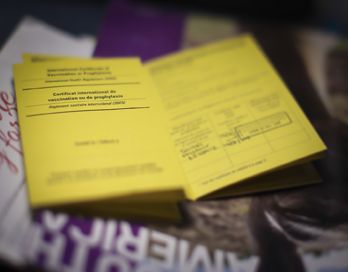Traveling for medical purposes has become increasingly common, and South Korea is known for its advanced medical facilities and healthcare expertise. If you are a Nigerian seeking medical treatment in South Korea, you will need to apply for a Korea Medical Visa. This guide will walk you through the process of obtaining this visa, including necessary documents, the application process, and useful tips to ensure a smooth experience.
Understanding The Korea Medical Visa?
The Korea Medical Visa is designed for individuals who wish to enter South Korea for medical treatment. This visa falls under the short-term visa category (C-3-3), which typically allows for a stay of up to 90 days (about 3 months). It is essential to understand the eligibility criteria and gather all required documents before starting the application process.
Eligibility Criteria
Gathering the required documents is a critical step in the application process. Here is a list of documents you will need:
- Completed Visa Application Form: This form can be downloaded from the website of the Embassy of the Republic of Korea in Nigeria. Ensure that all sections are filled out accurately.
- Passport: Your passport must be valid for at least six months from the date of application and have at least two blank pages.
- Passport-sized Photos: Two recent passport-sized photos (35mm x 45mm) with a white background.
- Medical Report: A detailed medical report from a recognized hospital or medical institution in Nigeria, explaining the diagnosis and recommended treatment.
- Appointment Confirmation: A letter from the South Korean medical institution confirming your appointment or treatment plan.
- Financial Proof: Bank statements for the last six months, proof of employment, or any other documents that can demonstrate your financial capability to cover the medical expenses and stay in South Korea.
- Visa Fee: The visa application fee, which may vary, so check the latest fee on the embassy’s website or by contacting them directly.
- Travel Itinerary: A copy of your travel itinerary, including flight bookings and accommodation reservations.
- Medical Insurance: Proof of medical insurance that covers your treatment and stay in South Korea.
- Letter of Guarantee: If applicable, a letter from a guarantor in South Korea who can take responsibility for your stay.
Application Process
Step 1: Obtain the Visa Application Form
The first step in applying for a Korea Medical Visa is to obtain the visa application form. You can download this form from the website of the Embassy of the Republic of Korea in Nigeria or collect it in person from the embassy.
Step 2: Complete the Visa Application Form
Carefully fill out the visa application form with accurate and truthful information. Ensure that all sections are completed, as incomplete forms can lead to delays or rejection.
Step 3: Gather Required Documents
Collect all the required documents listed above. Ensure that each document is up-to-date and accurate. Photocopy all documents for your records.
Step 4: Schedule an Appointment
Contact the Embassy of the Republic of Korea in Nigeria to schedule an appointment for submitting your visa application. It’s advisable to schedule the appointment well in advance to avoid any last-minute issues.
Step 5: Submit Your Application
On the day of your appointment, visit the embassy with all your documents. Submit your visa application form and the required documents. Pay the visa application fee as instructed by the embassy.
Step 6: Attend an Interview (if required)
In some cases, the embassy may require you to attend an interview. Be prepared to answer questions about your medical condition, the treatment plan, and your financial capability.
Step 7: Wait for Processing
After submitting your application, you will need to wait for the embassy to process your visa. Processing times can vary, so it’s important to apply well in advance of your planned travel date. You can check the status of your application through the embassy’s contact channels.
Step 8: Collect Your Visa
Once your visa is approved, you will be notified by the embassy. Collect your visa in person or through any other arrangement provided by the embassy. Ensure that all details on the visa are correct before your departure.
Tips for a Successful Application
- Start Early: Begin the application process as early as possible to allow ample time for gathering documents and scheduling appointments.
- Be Thorough: Ensure that all documents are complete and accurate. Incomplete applications can lead to delays or rejection.
- Follow Guidelines: Adhere to the guidelines provided by the embassy. Any deviation from the prescribed process can cause complications.
- Prepare for the Interview: If an interview is required, be prepared to discuss your medical condition and treatment plan in detail. Carry any additional documents that might support your case.
- Seek Assistance: If you are unsure about any part of the process, seek assistance from a visa consultant or the embassy. They can provide valuable guidance and clarify any doubts.
- Maintain Communication: Stay in touch with the medical institution in South Korea and the embassy throughout the process. Promptly address any requests for additional information or documents.
Embassy Contact Information
For any inquiries or to schedule an appointment, you can contact the Embassy of the Republic of Korea in Nigeria at:
- Address: Plot 10, Block 26, Adetokunbo Ademola Crescent, Wuse II, Abuja, Nigeria
- Phone: +234-9-782-6150/3
- Email: [email protected]
- Website: Embassy of the Republic of Korea in Nigeria
Applying for a Korea Medical Visa in Nigeria involves a detailed and organized approach. By understanding the eligibility criteria, gathering all required documents, and following the application process diligently, you can increase your chances of obtaining the visa successfully. South Korea offers world-class medical facilities, and with the right preparation, you can access the treatment you need. Start your application process early, be thorough with your documentation, and maintain open communication with the embassy and the medical institution to ensure a smooth and successful application experience.





Leave a Comment